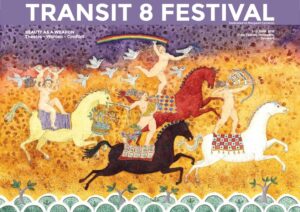BEAUTY AS A WEAPON
Theatre – Women – Conflict
1-12 June 2016
Presentation | Program| Workshops| Invited Artists
 Look at Transit 8 trailer
Look at Transit 8 trailer
During the talks and performances at the last Transit Festival in 2013, with the theme “Risk, Crisis and Invention”, I was struck by the recurring references to violence, both violence against women and the violence which it provokes in some women as a response. This is also evident also within our specific environment of theatre practice.
Every day we witness what seems like a worldwide war against women. In searching for effective ways to react, my only weapon is to do my work well: to give space to beauty, experience, contiguity, dialectic and poetry in a society apparently tainted by other values. Conflict as drama contributes to the engagement and motivation of theatre performances. The field of action implies a different use of words. In our craft the alternative to violence is not necessarily harmony and pacifism, but a fighting spirit that protects the values of life, diversity and exchange. When dealing with themes that evoke pain and exploitation I pursue a truth of simple stage presence and attempt to avoid exaggerated acting. I need to present beauty and wonder even amid the horror.
I have always been interested in the challenge of reclaiming words to build our theatre history as women. In 2013 I chose to use ‘crisis’ not in a negative sense, but as turning point for change; similarly for Transit 8, I have chosen ‘beauty’ combined with ‘weapon’ as an opposite to violence. I intend to question how conflict can result in a change of tension, a struggle to learn, an affirmation of generosity: necessary tools for our growth, with no desire to overpower others.
When the word ‘beauty’ is used in connection with women, it evokes preconceptions such as images of fashion models, and ‘beauty as a weapon’ makes us think of the way appearance can be used to seduce or persuade. But nature and art, with their asymmetry, revelation and questioning, are beautiful. The wrinkled face of an old woman from the dry regions of Brazil is beautiful. Something delicate, small and apparently insignificant can be beautiful. It is a political choice: to reject the hierarchical authority that imposes power from the top with expedients we will never have, we can only rely on the personal, on what each of us knows from experience, from a position that finds its centre at the margins.
While directing Anonymous, a performance dedicated to Susana Chávez, the Mexican poet killed after inventing the slogan “not one more dead woman” in relation to the feminicides on the border between Mexico and the USA, I knew I could not present this horror directly on stage. I could not confront the theme of brutality in a realistic way, because theatre does not have the same impact as the ruthlessness of history. Instead I needed the performance to move a few individual spectators through images, through the vulnerability of the women on stage and the softness of a classic guitar.
Can beauty help make the world a place worth living in? And what does beauty mean today for us women theatre practitioners? With the loss of ritual and the weakening of the depth of education, things like nationalism and football bring people together. Can theatre be an alternative space that does not avoid conflict but communicates through it? As women, we have changed the balance off patriarchal domination. But it is not yet evident how we can establish a new balance in which everyone can find her or his own autonomy and role. Perhaps theatre – where opposition and conflict are a source of creativity and indispensable to drama; where the physical body, images and senses are essential to the complexity of perception and interpretation – is a ground on which we can invent and experiment in search of a different outcome.
Many women (and two men) have been invited to Transit 8 Festival to contribute their points of view on its theme through performances, work demonstrations, workshops and talks. We know Transit will not give any definite answers to our questions, but I am sure we will all experience some moments of beauty that will furnish us with weapons of perseverance and poetry to continue our struggle in defence of women’s rights and expression. As in Dorthe Kærgaard’s image for Transit 8, we will brandish a rainbow in our hands while galloping on a wild horse.
Julia Varley
